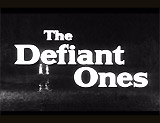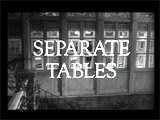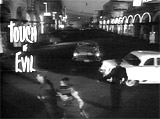
|
![]()
Greatest Films of the 1950s
1950 | 1951 | 1952 | 1953 | 1954 | 1955 | 1956 | 1957 | 1958 | 1959
Title Screen Film Genre(s), Title, Year, (Country), Length, Director, Description 

Ashes and Diamonds (1958, Poland) (aka Popiół i Diament), 103 minutes, D: Andrzej Wajda


Auntie Mame (1958), 143 minutes, D: Morton DaCosta


The Big Country (1958), 166 minutes, D: William Wyler



Cairo Station (1958, Egypt) (aka The Iron Gate, or Bab el Hadid), 77 minutes, D: Youssef Chahine



Cat on a Hot Tin Roof (1958), 108 minutes, D: Richard Brooks


The Defiant Ones (1958), 97 minutes, D: Stanley Kramer
Liberal director-filmmaker Stanley Kramer, well-known for directing heavy-handed, social issues dramas (such as Inherit the Wind (1960) and Guess Who's Coming to Dinner (1967)), helmed this social commentary film about racism. The film had 9 Academy Award nominations including Best Picture, Best Director, Best Actor (Tony Curtis), Best Actor (Sidney Poitier), Best Supporting Actor (Theodore Bikel), Best Supporting Actress (Cara Williams), and Best Film Editing, and won two Oscars: Best B/W Cinematography and Best Writing, Story and Screenplay - Written Directly for the Screen (Nedrick Young and Harold Jacob Smith). Two chain-gang convicts in the 1950s South - bigoted white Southerner John "Joker" Jackson (Tony Curtis) (convicted of armed robbery) and black Noah Cullen (Sidney Poitier, the first black actor to star in mainstream Hollywood films in non-stereotyped roles) (incarcerated for assault and battery) were shackled together. When they escaped from an overturned transport truck during a rainstorm, they had to cooperate with each other and put aside their racial animosities as they evaded the oppressive search of the police. Held together by a 29 inch steel chain, they were manacled to each other, and only bound by their will and determination to escape. Their pursuit was headed up by a local "humanitarian" - the liberal and compassionate Sheriff Max Muller (Theodore Bikel), with other more redneck state troopers and police officers with vicious tracking dogs. Although captured at Jackson's former place of work (a turpentine camp 60 miles to the north), they were confronted by Mack (Claude Akins) and a threatening lynch mob, although Big Sam (Lon Chaney, Jr.) stepped in and halted the bloodthirsty injustice, and then released the two to escape in the middle of the night. At an isolated farm house, they were cared for by needy, lonesome, abandoned and love-starved single mother (Cara Williams). Her devious plan to send Cullen off into the swamp while she ran off with Jackson to the city backfired when she betrayed his trust. Jackson chased after Cullen and told him: "That woman told you wrong." The film's classic image was of their clapsed white and black hands of the two desperately trying to help each other board a speeding train - Cullen reached back to pull Jackson up, but couldn't save him ("I can't make it! I can't make it!") and sacrificed his own freedom by jumping off. In the conclusion, Cullen defiantly sang the blues song "Long Gone" - with the wounded Jackson lying in his arms, before the two were apprehended by Sheriff Muller.



Elevator to the Gallows (1958, Fr.) (aka Ascenseur Pour l'échafaud), 88 minutes, D: Louis Malle


Gigi (1958), 115 minutes, D: Vincente Minnelli



Horror of Dracula (1958, UK), 82 minutes, D: Terence Fisher



I Want to Live! (1958), 120 minutes, D: Robert Wise
A film-noirish, low-budget, gritty biographical (yet heavily fictionalized) crime drama (with an original jazzy score) about capital punishment. Petty criminal (burglary, forgery, perjury), prostitute ("party girl"), and drug addict Barbara Graham (Susan Hayward) was also associated with West Coast low-life, underworld figures. She acted as a "shill" - bringing in unsuspecting men to be fleeced at a gambling parlor. Graham was charged by a grand jury with the brutal murder of crippled, 64 year-old widow Mabel Monahan during a robberty attempt in her Burbank, CA home in 1953, along with three known criminal accomplices: Emmett Perkins (Philip Coolidge), John R. 'Jack' Santo (Lou Krugman), and Bruce King (James Philbrook). Reportedly, the murder victim had $100,000 hidden somewhere in her home, but wouldn't divulge where. Although Graham was questioned thoroughly, she claimed her innocence, but her sordid past would cause her to be regarded as guilty from the start (without presumption of innocence). For the trial, she was defended by attorney Richard Tibrow (Gage Clarke). During the trial, King had been granted immunity, and claimed that Graham was a partner in the crime (she was nicknamed "Bloody Babs"). She had no solid or credible alibi - it couldn't be proved that she was home with her shifty, drug-addicted bartender-husband Henry/Hank and child on the evening of the crime. Wired undercover police detective Ben Miranda (Peter Breck) entrapped the desperate and anxious Graham (fearing the death penalty) into confessing, when she was falsely promised an alibi. She was convicted of the crime in 1954, and sentenced to death. During the torturously-long appeals process, she was represented by San Francisco newspaperman Ed Montgomery (Simon Oakland), and defended by psychologist Carl Palmberg (Theodore Bikel), who claimed she was anti-social, but not violent. However, her verdict could not be overturned ultimately, and she was not able to obtain clemency from the governor. After a few last-minute stays of execution were exhausted, 31 year-old Graham was sent to the gas chamber of San Quentin on June 3, 1955. The death scene was memorable. When strapping her in a chair, preparing the chemicals, and masking her, the prison guard added: "When you hear the pellets drop, count ten. Take a deep breath. It's easier that way." Graham quipped: "How do you know?"


Man of the West (1958), 100 minutes, D: Anthony Mann

Mon Oncle (1958, Fr.) (aka My Uncle), 117 minutes, D: Jacques Tati


Separate Tables (1958), 100 minutes, D: Delbert Mann


Some Came Running (1958), 137 minutes, D: Vincente Minnelli




Touch of Evil (1958), 95 minutes, D: Orson Welles
An off-beat, twisted, dark and sweaty, film noirish thriller, with murder, police corruption, kidnapping, betrayal, perversion and more in a squalid Mexican-American border town. Opens with a daring, captivating single-take sequence, ending with the explosive, car-bomb murder of an American businessman on the American side of the border. A self-righteous narcotics agent 'Mike' Vargas (Charlton Heston) becomes snarled in the local investigation with a grotesque, police captain Hank Quinlan (Orson Welles), ignoring his honeymooning bride Susan (Janet Leigh) who is meanwhile being terrorized in an out-of-the-way motel by a menacing gang. The experienced, old-time cop Quinlan habitually fabricates evidence to convict the guilty (even though his instincts are usually correct) and frames a young Mexican for the murder, putting him into conflict with the narcotics detective. The corrupt, overweight police captain is finally brought down by Vargas' persistent, perilous efforts with the cooperation of Quinlan's long-time partner Sgt. Pete Menzies (Joseph Calleia).


Vertigo (1958), 128 minutes, D: Alfred Hitchcock
Arguably Hitchcock's most complex, most analyzed, compelling masterpiece, involving a man's compulsive obsession to exploitatively manipulate and transform a woman to match his fantasy. Vertigo-suffering, acrophobic detective John 'Scottie' Ferguson (James Stewart) trails an old college friend Gavin Elster's (Tom Helmore) wife as she wanders around San Francisco - a cool, blonde named Madeleine (Kim Novak). Meanwhile, Scottie's friend 'Midge' Wood (Barbara Bel Geddes) expresses unrequited love for him. Madeleine's obsession with a tragic ancestor Carlotta Valdez intrigues Scottie, and after saving her from a suicidal jump into the Bay, he falls in love with her. When she falls to her death from a tower in an assumed suicide, he spirals down into a deep depression. Haunted and obsessed with the dead woman, he meets her lower-class double Judy (Novak again) and manipulates her into changing into the dead Madeleine's image - with mad consequences in the uncompromising conclusion.